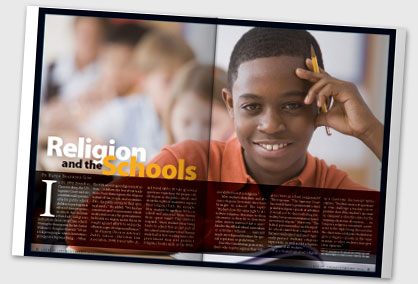Religion and the Schools
Haven Bradford Gow January/February 2012
In its 1952 Zorach v. Clauson ruling, the U.S. Supreme Court said it is constitutionally permissible for public school children to participate in released-time programs in which the children attended religious instruction classes away from school. Writing for the majority, the late Justice William O. Douglas observed: “We are a religious people whose institutions presuppose a Supreme Being. . . . When the state encourages religious instruction . . . it follows the best of our traditions. For it then respects the religious nature of our people and accommodates the public service to their spiritual needs.” He added: “We find no constitutional requirement which makes it necessary for government to be hostile to religion and to throw its weight against efforts to widen the effective scope of religious influence.”
In Keeping Christ in America’s Public Schools (Christian Law Association, 2008) David Gibbs, Jr., and David Gibbs, III take up several questions regarding the proper role of religion in the public schools and about the rights of students to express their religious faith. For example: May students bring their Bibles to school and also read them during their spare time? The Gibbses respond: “Since students may bring books to school that are not part of the school curriculum to read during study hall or free-reading times, the government may not prohibit religious books such as the Bible merely because it is religious.”
May students distribute and discuss religious literature they have brought to school? The reply: “Students have the same right to distribute religious literature to their classmates as they do to distribute other written material that is unrelated to the official school curriculum or activities. Schools . . . may not single out religious literature for special regulation or prohibition.”
Does the Constitution protect students who want to express their religious views in school assignments? The response: “The Supreme Court has stated that if a government school prohibits religious speech or activities, it would not be demonstrating neutrality, but an unconstitutional hostility toward religion.” Moreover: “The federal government has said that public schools must treat religion with fairness and respect and must vigorously protect students’ religious expression, as well as the religious conscience of all students.”
May a student talk about religion in a classroom discussion? Gibbs replies: “Students may ask questions or even challenge a teacher’s viewpoint in class if the student’s question or comment is directly related to the ongoing classroom discussion. . . . As long as a religious comment is pertinent to the topic being discussed in the classroom, a religious student may give a religious opinion in the same manner as other students may give their opinions.”